I often spend hours reading the first few words in other people’s tweets. Occasionally, someone will drop in a mention of the “nuclear family.” Well, this just happens to be the focus of many works that I have read or watched over the years. Why this topic would attract SF authors is obvious: the struggle to survive a thermonuclear exchange is made much more thrilling if the protagonists have to worry about or care for other family members endangered by flash, blast, fall-out—not to mention the long-term consequences of a nuclear holocaust.
Here are five examples of the subgenre.
“That Only a Mother” by Judith Merril (1948)
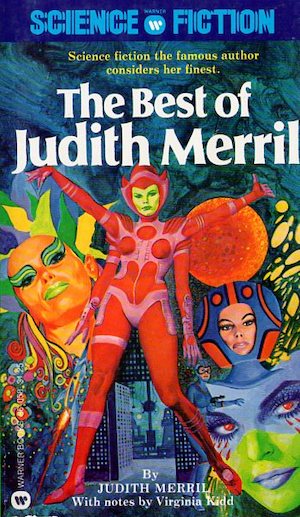
Human ingenuity can (sometimes) surmount even tremendous challenges. Thus, good old American know-how (and presumably Russian know-how as well) gave the world an almost languorous nuclear war, in which years of atomic exchanges have failed utterly to end civilization. That said, everyone is expected to do their bit for the war effort. In Margaret’s case, this includes delivering and raising her baby despite husband Hank being assigned war duties far from home.
Motherhood in times of atomic war is even more fraught than in peacetime. America is saturated in sublethal fall-out. Mutated babies seem to be more common than not, a development to which fathers in particular react very badly. Not to worry! In Margaret’s eyes, her infant could not be more perfect.
Permitted a rare visit home, Hank may have a different perspective.
Davy by Edgar Pangborn (1964)
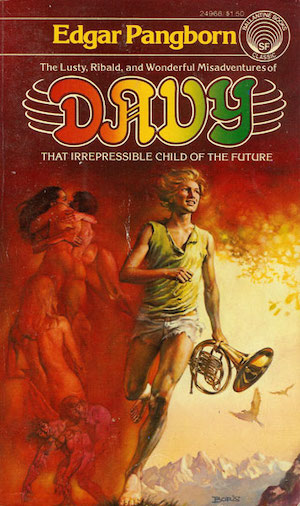
Davy need not worry about the immediate effects of the Twenty Minute War, nor the plagues that followed. He was prudent enough to be born three centuries later, when the war and its aftermath had long since become little-understood historical fables in the backward, superstitious nations along what was once the American Atlantic coast. His concerns are far more immediate: personal freedom, sporadic political idealism, and his endless quest for cooperative young women.
Even steadfast lotharios can fall in love. Nickie is Davy’s true love, the woman with whom he would like to spend the rest of his life. The Twenty-Minute War is three centuries in the past, but its legacy is hidden within human chromosomes. Nickie will spend the rest of her life happily married to Davy. Davy, on the other, will very soon become a grieving widower.
“Lot” by Ward Moore (1953)
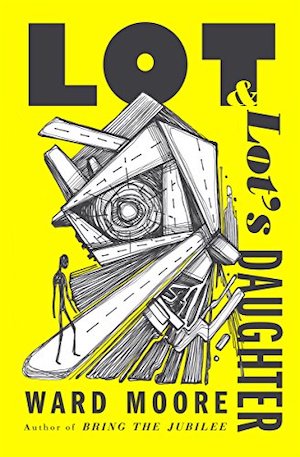
Facing the outbreak of nuclear war, many Americans may have been willing to squander their lives futilely trying to defend their nation against foreign attack. Not Mr. Jimmon! Mr. Jimmon has a family to protect and a very clear, very unromantic grasp of what that entails. Let other Americans worry about America. Mr. Jimmon will worry about the Jimmons.
The Jimmon family’s survival is no mere fluke of good luck. Mr. Jimmon foresaw the impending atomic war and took appropriate steps. Step one: abandon the vulnerable Jimmon suburban home to flee to a more defensible location. Woe to the fools who get in the Jimmons’ way, for Mr. Jimmon is willing to be as ruthless, as monstrous, as survival demands.
This story was the basis of the movie Panic in Year Zero. The family in that adaptation was less prepared but just as selfish.
“A Letter from the Clearys” by Connie Willis (1982)
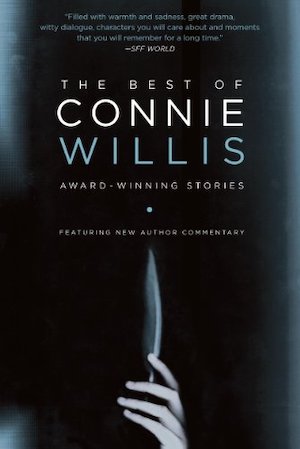
For fourteen-year-old Lynn, backwoods life in the shadow of Pikes Peak’s scorched heights is a long series of personal inconveniences: unseasonal cold, minimal food, frequent burns from the rustic woodstove her family uses. It’s also boring. She amuses herself by attempting to solve a minor mystery.
The Clearys had intended to join Lynn and her family in their bucolic resort. They never arrived, nor did any explanation appear in the mail. Lynn is convinced that the Clearys’ letter was simply misfiled. She searches the local post office and finds the missing letter.
The explanation is simple: domestic problems prompted the Clearys defer their trip for one month. A month memorable for a nuclear holocaust.
At least the Clearys avoided the long misery of survival in a nuclear winter.
Long Voyage Back by Luke Rhinehart (1983)
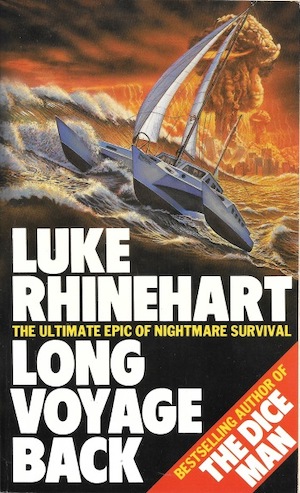
The trimaran Vagabond is out sailing in Chesapeake Bay when nuclear war breaks out. Neil Loken, Jim Stoor, and an assortment of friends and family on board the Vagabond survive nuclear incineration by mere luck.
Having survived the immediate effects of the nuclear exchange, the crew and passengers of the Vagabond must now survive the long-term effects of the war. Landing is easy enough. But life on land is not kind. Unless the people on board the Vagabond are both lucky and cunning, they may have traded a swift, almost merciful death for a much slower, more painful demise.
***
These are just five works in this popular subgenre. No doubt many of you have favourites not mentioned above. Comments are, as ever, below.
In the words of fanfiction author Musty181, prolific book reviewer and perennial Darwin Award nominee James Davis Nicoll “looks like a default mii with glasses.” His work has appeared in Publishers Weekly and Romantic Times as well as on his own websites, James Nicoll Reviews (where he is assisted by editor Karen Lofstrom and web person Adrienne L. Travis) and the 2021 and 2022 Aurora Award finalist Young People Read Old SFF (where he is assisted by web person Adrienne L. Travis). He is a four-time finalist for the Best Fan Writer Hugo Award, and is surprisingly flammable.










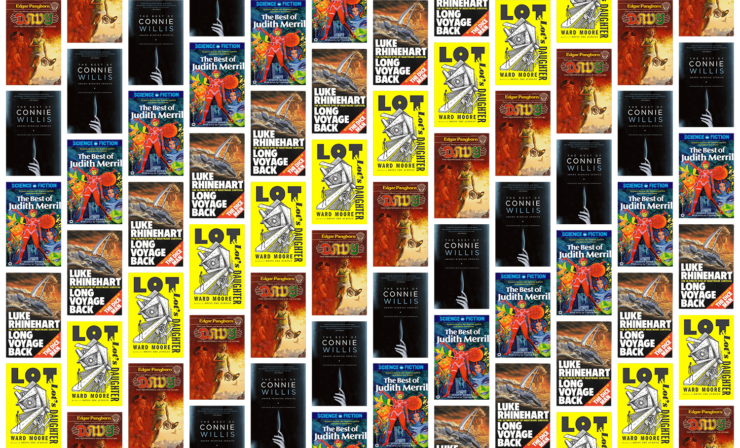
Someday I am going to have to bite the bullet and read Farnham’s Freehold.
@1, you really don’t have to. It’s not good
There certainly have been many good stories centered around struggles to survive after a nuclear war. Two others that come to mind are Pat Frank’s “Alas, Babylon” and David Graham’s “Down to a Sunless Sea”. However, the term “nuclear family”: pre-dates the atomic age by decades. Per the OED, it originated in social anthropology in the 1920s, with nucleus meaning “a basic or essential part” and describing the core elements that make up a family (usually parents and children).
#3 ….that’s the joke.
Bradbury’s “There Will Come Soft Rains” comes to mind here…
I can’t place the title or the author now, but I remember a story, maybe a short, maybe a novella, where a community rigorously destroyed all mutants in an effort to keep its people normal. One scene has a newborn being examined by a neighbor. The mother says everything’s perfect, but the neighbor finds something …. (not spelled out in the conversation).
This was just one scene in the story, which otherwise was about (I think) two telepathic sisters in the community. The younger sister was enormously more powerful than the older sister, and near the end of the story she was able to contact another telepathic community in Australia (or maybe NZ).
I believe you are thinking of John Wyndham’s The Chrysalids AKA Re-Birth, which is set in post-atomic Labrador.
https://en.wikipedia.org/wiki/The_Chrysalids
Let us not forget the film “Testament”, which tore out my heart and stomped it flat. Which I believe was the point, but I was sobbing as hard as Jane Alexander when she got that last belated answering-machine message…
I’ve read That Only a Mother as is one of the stories included in the anthology The Science Fiction Hall of Fame (which is an excellent book, by the way, that deserves its title).
It’s not exactly a “nice” story but it surely is memorable, haunting even.
@7 – Yeah, the description of The Chrysalids does sound a lot like what I remember — the name Petra even rings a bell in my memory. I just didn’t think it was a whole novel. I see on isfdb that it was serialized in Argosy, but I really doubt I saw it there. Oh well.
@6 A similar event happens in Bujold’s “The Mountains of Mourning”, although it’s a generational clash; the conditions that made such an attitude seem reasonable in a resource-poor environment no longer apply.
@1, @2 – REALLY don’t bother, the plot combines racism, misogyny, incest and “Heinlein protagonist who is always right” into a festering pile of crap.
Can’t remember title.
The father is obsessed(?) with getting a survival suit for his daughter.
James Morrow.This is the way the world ends.
@1: No, you don’t. Let me spoil the theme of the book for you:
“we can’t ever let black people take power, because they’ll not only enslave us but will eat us.”
Bradbury’s Martian Chronicles is as much about a nuclear war as it is about Mars.
@2: I agree, it’s a pretty damn bad book, but the reason is interesting. Heinlein set out to do two things: to show how bad a nuclear war would be (so that things are still rotten thousands of years on), and — believe it or not — to show that he had no prejudice against Blacks. The whole arc with the character of Joe is his attempt to do this.
@15: Can’t completely argue with you. Whatever Heinlein intended, that’s what came out. (And people wonder why we say that authors have no special privilege in the interpretation of a book….)
16: Tick-tock, seven o’clock, time to get up, time to get up, seven o’clock!
@10 Maybe here: The novel was adapted for BBC radio by Barbara Clegg in 1982, with a further adaptation by Jane Rogers in 2012
It very much sounds like it
The short story “Tomorrow’s Children” by Poul Anderson and F. N. Waldrop follows the post-nuclear reconstruction of society and the revelation that not only are there are a lot of mutant births, but the mutant birth rate is climbing and the “normal” human birth rate is declining such that the former will eventually overtake the latter.
Phillip Wylie’s Triumph shows how a family and assorted hangers on can survive a niclear exchange long enough to be rescued. All it takes is a multimillion dollar (1950s dollars) fallout shelter. Everybody else in the US dies, but that’s just the meritocracy in action. Bet you wish you had skipped all those lattes and avocado toast and built your own multimillion dollar shelter, huh?
This feels like the unofficial sequel to that article before about “cannon” SF.
Judith Merrill’s “Shadow on the Hearth”
“Tomorrow” by Wylie, (I think).
@22 We can only imagine what other pun-ishment awaits…
Re: In the interest of keeping the conversation as civil as possible, let’s leave Farnham’s Freehold aside–it’s been covered in earlier comments, people obviously have strong opinions about it, and there’s little to be gained from focusing so much of the conversation on that particular work, although I’m sure there are plenty of discussions of it elsewhere online. Let’s move on…
PS238, by Aaron Williams, has a Nuclear Family:
https://ps238.nodwick.com/comic/11182011/
_____________________________________________
1: She’s the eighty-fourth superhero with the powerset of flight, invulnerability, strength, and speed.
FISS may be boring but it’s extremely useful.
(has flashback to Mutants & Masterminds game in which my character was the only one who could move heavy objects)
rpresser et al: Re-Birth was my first thought on seeing Davy listed. The obvious place for people now alive to have seen it is the Boucher Treasury of Great Science Fiction, which was an offering from SFBC and widely available in libraries for decades after it came out. Somebody with more copyright-fu than I have should try to get Wyndham back into print; there are several good novels, but Re-Birth is especially relevant now that SCOTUS has granted free license to one side of religion. Interesting fact: the lines from the head of the New Zealand rescue party became the title song of Jefferson Airplane’s Crown of Creation — founding member Paul Kantner (AFAIK the first SF fan to become a rock star) got a Hugo nomination a little later for Blows Against the Empire.
@20: The story was extended by Anderson alone into the novel Twilight World.
ISTR that in the Baldy series (by Kuttner and Moore), the telepathic mutation, and the hair absence that marks it, are the result of an atomic war; the first of these stories, “The Piper’s Son”, involves a dispute between a son seduced by a we’re-the-superior-race fanatic and his we’re-all-people father.
You could, I believe, read any issue of a 1950s SF magazine and find at least one story dealing with either a nuclear war in progress, or the aftermath of one. (or maybe one being averted.) So lots of those would likely fit into this category!